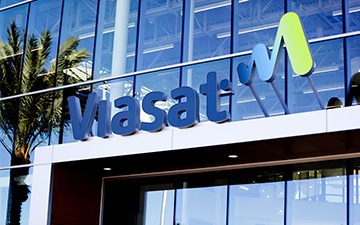Viasat Closes Inmarsat Acquisition

Viasat closed its acquisition of Inmarsat late Tuesday, completing a merger of two of the largest satellite operators. The acquisition brings together 19 satellites in Ka-, L-, and S-bands, and Viasat is pitching the acquisition as a way to better compete in the changing satcom industry.
Viasat founder Mark Dankberg will lead the combined company as chairman and CEO, with Guru Gowrappan as president. Gowrappan is a former Verizon Media executive, who led the the media division of Verizon Communications, which included Yahoo, HuffPost, TechCrunch, and other brands. Gowrappan joined Viasat in April.
“The combination of our companies brings together the people, technology, innovation, network assets, spectrum resources and global partnerships needed to help connect the world more affordably, securely and reliably. Together, we believe we are positioned to offer customers a multi-layered network that gives them the right connectivity at the right time, place and price,” Dankberg commented.
Inmarsat CEO Rajeev Suri will step down from his role and serve on Viasat’s board of directors. Suri is a former CEO of Nokia, who joined Inmarsat in 2021, eight months before the acquisition deal was announced.
Corporate headquarters will continue to be in Carlsbad, California, but the company will still have a strong presence in the United Kingdom, with its global international businesses headquarters in London.
George Freeman MP, the U.K.’s Minister of State at the Department of Science, Innovation & Technology, said the move will bring significant investment, hundreds of new highly skilled jobs and drive economic growth in the U.K. “Having met both companies, I look forward to working with them as we use the U.K.’s regulatory freedom and leadership to support advanced technologies to boost the space economy’s productivity, profitability and sustainability,” he said.
Viasat explained the financial terms of the deal, reporting Inmarsat’s shareholders received an aggregate of $551 million in cash and approximately 46.36 million shares of common stock. The cash portion of the purchase price was reduced from $850 million to $551 million after Inmarsat paid a $299 million special dividend to its shareholders in April 2022.
The shares issued to the Inmarsat shareholders at the closing represent an aggregate of approximately 37.6% of the total shares of Viasat common stock on a fully diluted basis.
Viasat drew down approximately $1.35 billion of its committed financing package, including a $617 million secured term loan facility and a $733 million unsecured bridge loan. Viasat said the lower financed amount reflects the reduction in the cash component of the purchase price.
It was a lengthy approval process, taking about a year and a half to close after it was announced in November 2021. The acquisition was originally set to close in the first second half of 2022.
Viasat and Inmarsat secured final approval from the European Commission just last week after an in-depth investigation into how the merger will affect competition in the in-flight connectivity (IFC) market found that it will not cause significant competitive issues. A recent U.K. regulatory authority came to the same conclusion.
When the merger was first announced Dankberg said the total addressable markets that the two companies could exploit could grow from $985 billion in 2020 to a possible $1.6 trillion in 2030. The consumer market alone in 2030 could be worth over $900 billion according to Viasat/Inmarsat estimates.
Viasat has said the transaction will diversify satellite services revenue with a bigger emphasis on mobility. The operator recently launched its long-awaited ViaSat-3 satellite, the first of three high-capacity Ka-band satellites that will give the operator global coverage. The ViaSat-3 satellite grows capacity over the U.S. which Dankberg said will support commercial in-flight connectivity and broadband.
Inmarsat is upgrading its Elera L-band satellite network, and has launched two I-6 satellites with both L-band and Ka-band payloads to support mobility, government, and IoT. Just last week, the operator three small Geostationary Orbit (GEO) satellites from Swissto12 for the eighth-generation of its L-band network.
“Our goal is to be the undisputed leader in satellite communications with a sharp focus on providing the best products and services for our customers,” Gowrappan said of the combined company. “This combination broadens the global fixed and mobile services available to customers in an industry-defining moment.”